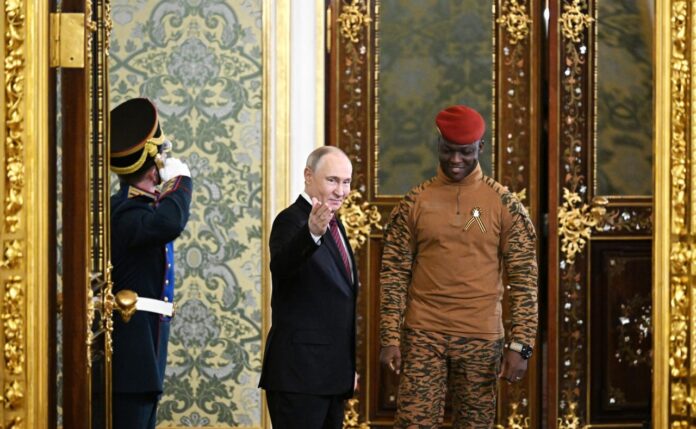Seringe S.T. Touray
There was little pomp, but plenty of symbolism, when Russia’s President Vladimir Putin received Burkina Faso’s Captain Ibrahim Traoré at the Kremlin on Saturday, May 10th. The visit, which occurred following Friday’s commemorations of the Soviet victory in World War II, seemed to double as a message: ties between Moscow and Ouagadougou are getting tighter.
“We are very glad to see you,” Putin told Traoré as they sat down for talks. “Your visit to Russia to celebrate the 80th anniversary of the victory is a great symbol and it reflects the friendly character of relations between Burkina Faso and Russia.”
The two had last met in St. Petersburg at the 2023 Russia-Africa Summit. This time, Putin went a step further, pointing out a detail often left out of history books: roughly 30,000 Burkinabè had joined the anti-Hitler coalition under Charles de Gaulle’s command in World War II (1939–1945). “Some 30,000 Burkinabè fought with the anti-Hitler coalition forces under the leadership of the legendary Frenchman Charles de Gaulle,” he said.
From there, the conversation turned to more contemporary concerns — chiefly terrorism and state-building. “We will continue to support the republic in fighting against unlawful factions that are still operating in some parts of Burkina Faso,” Putin stated, drawing a line between historical struggles and today’s fight for security.
Trade and diplomacy weren’t left out. Putin flagged the reopening of Russia’s embassy in Ouagadougou after a three-decade absence, and also referenced a 2024 event titled the Economic Days of Burkina Faso in Russia. “Even if trade is modest, it’s growing—which is a good trend and we need to preserve it,” he noted.
Education and humanitarian outreach also got significant attention. “In 2024 and in 2025, the quota of Russian state scholarships for Burkinabè nationals was more than doubled,” Putin said. He mentioned that over 3,500 Burkinabè have studied in Russia so far and confirmed 27 new scholarships would be awarded this year.
On his part, Captain Traoré expressed gratitude for the invitation. “It was an honor to be part of the commemorative events devoted to the great victory anniversary,” he said. “I learned a lot about the culture, about history that lay the foundation of the resistance of the Russian people.”
He didn’t shy away from addressing global politics either. “Despite all the sanctions that were imposed on the Russian Federation by many states, Russia is still holding the leading position internationally,” Traoré said. “We understand how difficult it is.”
He pushed for deeper cooperation in areas he sees as key to Burkina Faso’s long-term development — especially in knowledge transfer and skills training. “We would like to see Russia assisting us in training and educating our youth to help us develop our own industries, our own enterprises, machinery, and other types of manufacturing,” Traoré explained.
He was even more direct on technology. “The most important thing you can help with is the exchange of technology and experience. We need to understand how we can use the experience and knowhow that Russian universities have and how we can spread it to Burkina Faso,” he said.
Traoré called terrorism a “legacy of imperialism” and stressed the urgency of strengthening both defense capabilities and the nation’s human capital. Education, he said, remains the “essential task” ahead.
The visit adds another entry in Russia’s growing push to connect with African nations at a time when its Western relationships remain strained. For Burkina Faso, the engagement holds out prospects for greater military support, tech access, and educational collaboration — all seen as vital for rebuilding a country still navigating instability and searching for a self-sustaining future.




